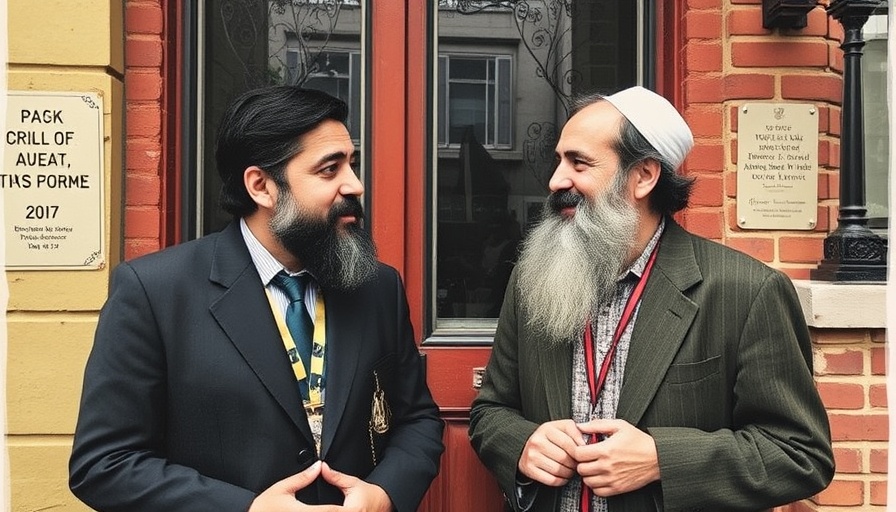
Understanding Zohran Mamdani's Controversial Candidacy
In the heart of Brooklyn, a storm brews—not just from the unrelenting nor’easter, but from the heated divisions within the Jewish community surrounding rising mayoral candidate Zohran Mamdani. The recent town hall event at Congregation Beth Elohim showcased this fracture vividly. As supporters and protesters clashed, it became clear that Mamdani, with his progressive platform, is at the center of a significant cultural and political reckoning—not just for himself, but for Jewish voters across New York City.
The Split in Jewish Perspectives on Mamdani
Mamdani’s candidacy has triggered deep-seated divisions among Jewish voters. Many see him as a voice for progressive change, a necessary shift in a political landscape often dominated by more conservative stances. Conversely, others view his past anti-Israel statements and associations with movements like Boycott, Divestment, and Sanctions (BDS) as direct threats to Jewish community safety and identity.
The complexities of his candidacy were further explored recently at a gathering of Jewish leaders. Attendees, primarily from the Modern Orthodox community, expressed concerns over Mamdani's controversial rhetoric about Israel and his response to rising antisemitism. One participant even raised the specter of personal safety, referring to recent harassment experiences and questioning the adequacy of security measures for Jewish community events. His commitment to ensure safety, he assured them, would be unwavering—an attempt to bridge the gap between skepticism and support.
Beyond Party Lines: The Realities of Jewish Voter Sentiment
Polling suggests that Mamdani, despite contention, has secured widespread support across various segments of the Jewish population. Yet, he has also ignited a fierce debate about the future of Jewish political influence. As commentary from various Jewish organizations has emerged, a consensus is forming that challenges the status quo: Mamdani—or someone with similar ideas—could potentially redefine what it means to advocate for Jewish interests in a landscape increasingly dominated by progressive ideals. The voice of dissent, notably from entrenched Jewish leadership, raises critical questions about representation and alignment within such a vibrant community.
Examining the Reactions and Implications for New York
With the election rapidly approaching, reactions to Mamdani's candidacy reveal much about the Jewish community's fractured landscape. A prominent Jewish political figure expressed concern that failing to engage robustly with candidates like Mamdani could leave the community vulnerable to ideologies that do not reflect their values. Liel Leibovitz from Tablet magazine poignantly articulated the crisis of leadership, challenging Jewish organizations to better mobilize and support candidates who align with community needs.
This tumultuous backdrop leaves the Jewish community at a crossroads, where dialogues must transcend past grievances to forge a sustainable path forward. Community leaders reaffirm the importance of recognizing diverse perspectives and engaging constructively, as every voice—be it for or against Mamdani—matters as New York seeks its next mayor.
A Future Shaped by New Alliances
The progression of Mamdani's campaign highlights not only the urgency of dialogue within the Jewish community but also the necessity of adapting to a changing political landscape. With increasing numbers of younger voters feeling disconnected from traditional Jewish platforms, Mamdani's outreach strategy—which has included attending various Jewish services and forums—demonstrates a keen awareness of the need for inclusivity and dialogue.
His commitment to engage with all factions of the Jewish spectrum, from more left-leaning individuals to modern observants, reflects an easing of tensions that have historically defined these dialogues. If successful, Mamdani could pave the way for a generation of politically active Jews who prioritize a truly inclusive and multifaceted approach to governance and community engagement.
Calls to Action for the Jewish Community
As the November election looms, the Jewish community faces pivotal decisions. Emphasizing the importance of understanding neighborly perspectives can transform potential antagonism into collaborative engagement. Community members are encouraged to attend open forums, participate in discussions about policies affecting their lives, and actively engage with candidates like Mamdani to ensure a representation that aligns with their values and experiences. The call to action is clear: the Jewish community can no longer afford to remain passive.
This election season offers an opportunity for self-reflection and revitalization—a chance to redefine what it means to be a Jewish voter in New York City today.
 Add Row
Add Row  Add
Add 




Write A Comment